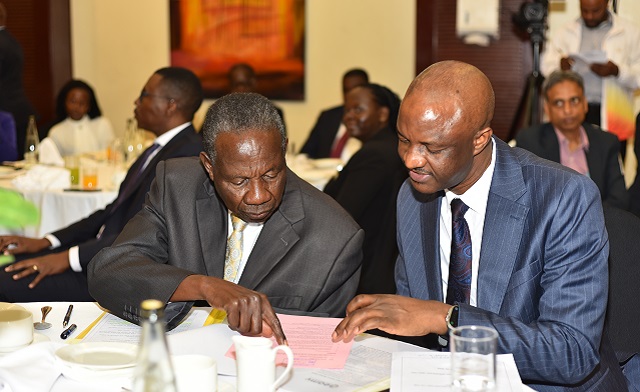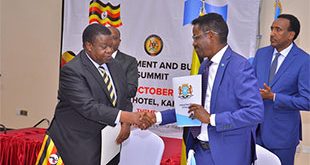
But stakeholders urge the lender to accelerate private sector growth through affordable interest rates currently capped at 15% per year
Kampala, Uganda | JULIUS BUSINGE | Uganda’s Finance Minister, Matia Kasaija, has urged the East African Development Bank (EADB) to implement strategies that ensure affordable interest rates for borrowing, enabling businesses to access much-needed capital at sustainable costs.
He emphasized the critical role of the private sector in driving economic growth and job creation, particularly for the youth, and called on the bank to enhance its support for enterprises seeking to expand and invest in productive sectors.
Furthermore, Kasaija highlighted the need for the EADB to align its financing initiatives with Uganda’s economic development agenda by prioritizing key sectors such as infrastructure, agriculture, manufacturing, and energy, which are essential for long-term growth and national prosperity.
Kasaija made the remarks during a breakfast meeting organised by EADB in which the latter engaged its stakeholders on its impact on the Ugandan economy and updated about its overall mandate at Kampala Serena Hotel on Feb.10.
The same appeal was echoed by Ramathan Ggoobi, the permanent secretary and secretary to the treasury.
“We need to see more private sector players borrowing,” Ggoobi said. He said entities like EADB are critical in supporting the government’s long-term growth strategy aligned to ATMS – agro-industrialization, tourism development, mineral-based industrial growth, including oil and gas, and science, technology, innovation, and ICT.
USD 200 disbursed to EAC states
In line with its mandate to promote sustainable and inclusive socio-economic development and regional integration, the East African Development Bank (EADB) has disbursed over USD 200 million (approx. Shs734.8bn) to Kenya, Uganda, Tanzania, and Rwanda in the last five years through its lending operations, executives said. The lender caps interest rates at between 14 -15% per annum.
Its interventions have led to the creation of over 110,000 jobs across key sectors, including infrastructure, manufacturing, agriculture & agri-processing, and social services.
Notably, 49% of these jobs were awarded to women, reinforcing EADB’s commitment to inclusivity and sustainable development.
Recognizing the vital role Micro, Small, and Medium Enterprises (MSMEs) play in socio-economic growth, EADB has financed over 10,500 MSMEs across the region, disbursing USD 99 million through direct lending and partnerships with financial institutions.
Kasaija, who also doubles as the Chairperson of the EADB Governing Council commended the Bank’s role in driving Uganda’s economic growth and social transformation.
Boosts local MSMEs
In Uganda, EADB has advanced a cumulative Shs209.4 billion to MSMEs, a sector that serves as the backbone of the economy. The financing, channeled through the Rural Finance Enhancement Program (RFEP) and the Agri-finance Enhancement Program (AEP), has supported a wide range of businesses and created over 35,850 jobs, with approximately 60% of these opportunities benefiting women and vulnerable groups.
EADB Acting Director General, Benard Mono, emphasized that the Bank’s investment in SMEs is based on their pivotal role in Uganda’s economic progress, accounting for 1.1 million of the country’s total businesses.
“We cannot understate the role SMEs play in Uganda’s economy as key drivers of innovation and job creation. Our commitment to enhancing financial access and inclusion for SMEs remains steadfast. Through strategic partnerships with financial institutions, EADB aims to support an additional 10,000 SMEs this year, fostering socio-economic development across Uganda and the East African region.”
The partner’s engagement forum also explored economically viable and environmentally sustainable projects that EADB plans to invest in over the next four years under its 2024-2028 Strategic Plan. Aligned with member states’ national strategic priorities and the United Nations Sustainable Development Goals (SDGs), these projects span Industrialization and manufacturing, Infrastructure, Agriculture and agri-processing, Social Services, Climate Change, and environmental Management.
EADB’s commitment to building resilient and prosperous economies is further strengthened by its strong credit rating from S&P Global Ratings, a leading global credit rating agency.
“Last year, S&P Global Ratings assigned EADB an ‘A’ credit rating—the highest in East Africa—recognizing our critical policy mandate, strong financial profile, extraordinary shareholder support, and sound governance structures,” Mono said.
“This rating opens vast opportunities for mobilizing cost-effective resources, essential for driving sustainable development initiatives in East Africa. The stable outlook underscores confidence in EADB’s ability to expand its footprint across member states while maintaining financial strength.”
 The Independent Uganda: You get the Truth we Pay the Price
The Independent Uganda: You get the Truth we Pay the Price




